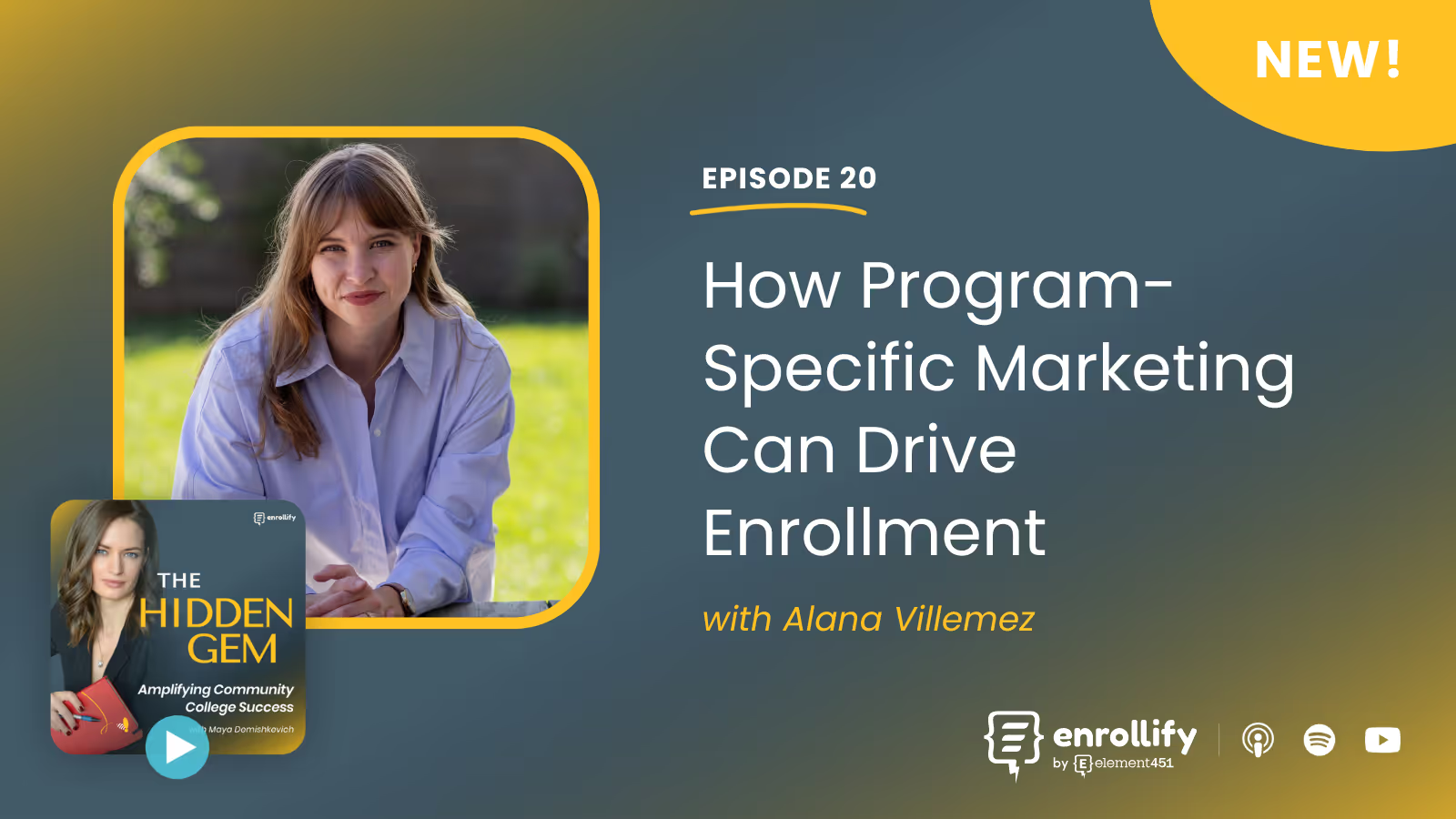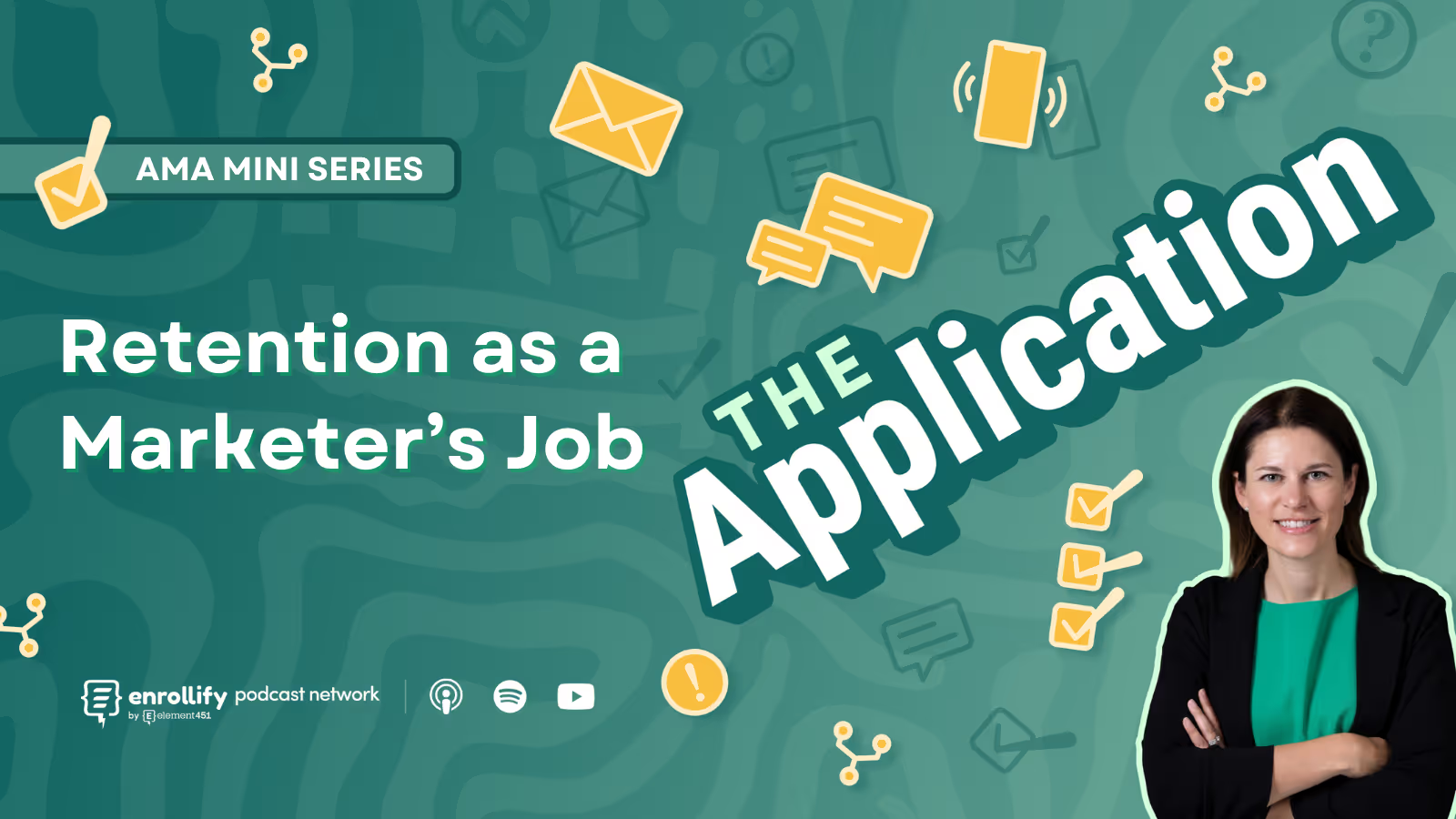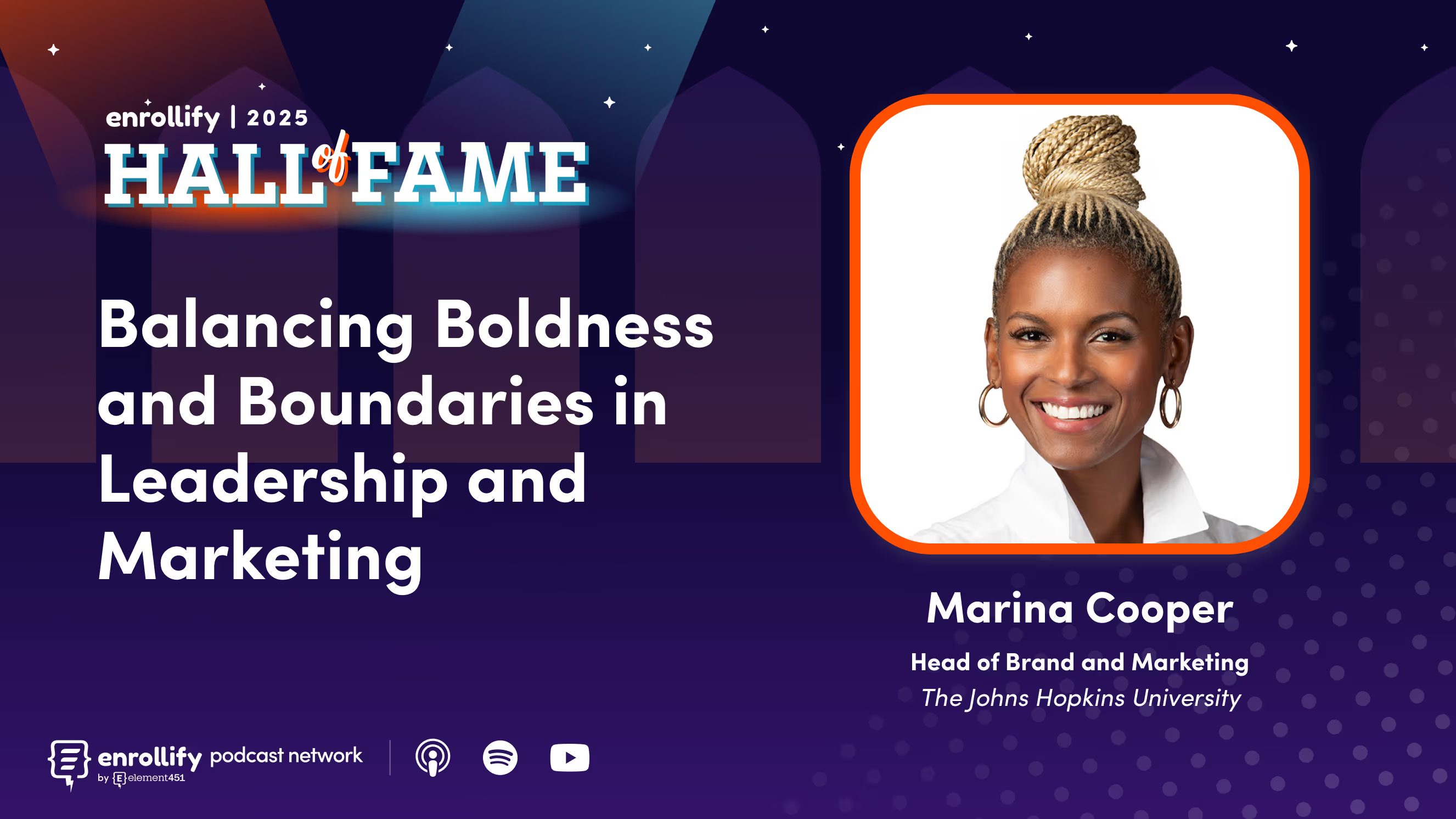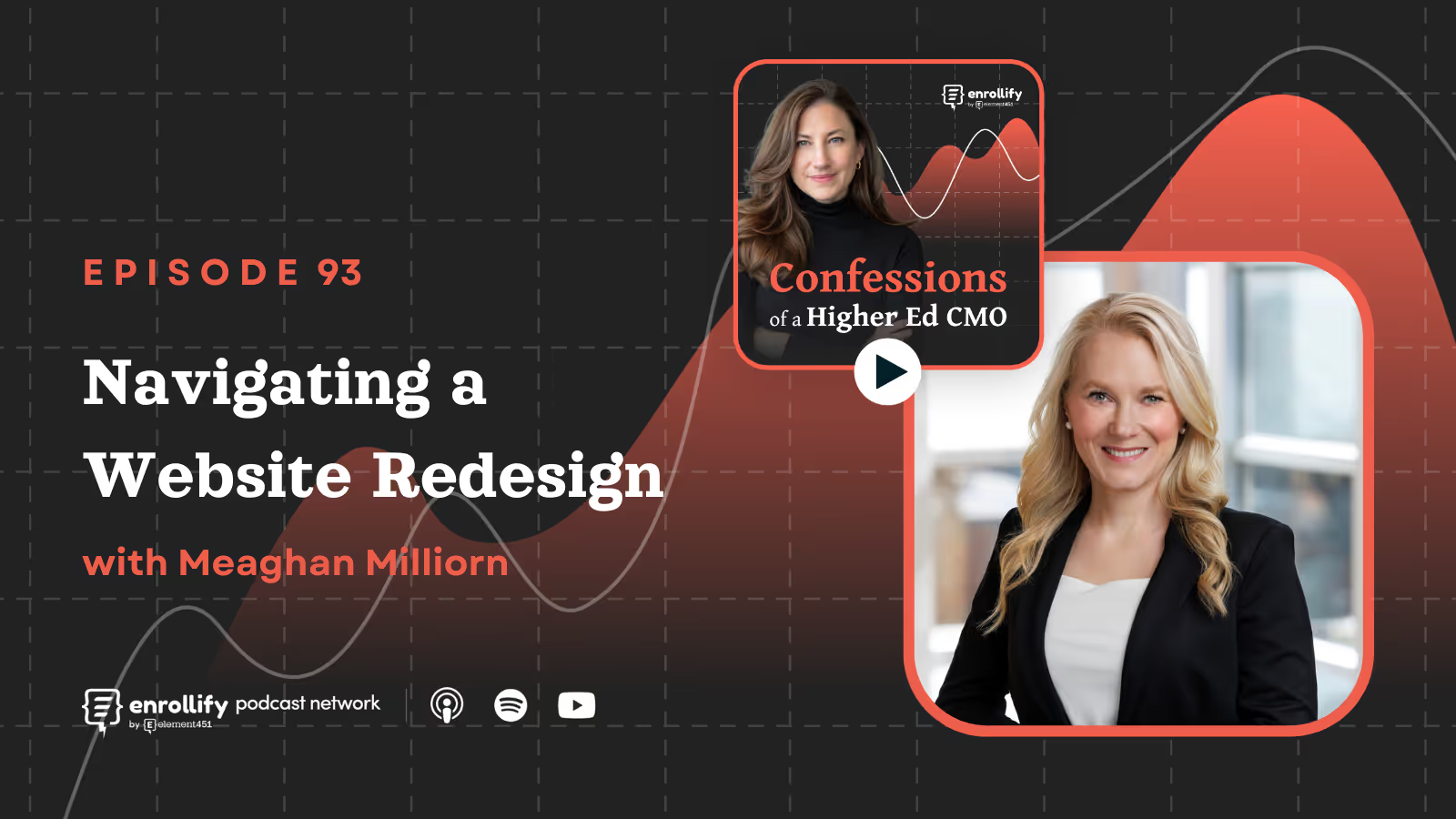About the Episode
About the Episode:
In this episode of The Hidden Gem, Maya Demishkevich welcomes Alana Villemez, CEO of Most Likely to Succeed, to discuss the growing importance of program-specific marketing for community colleges. With extensive experience working with over 100 colleges, Alana shares insights into why colleges should prioritize marketing specific programs over broad awareness campaigns and how to effectively allocate limited resources to those efforts.
Key Takeaways:
- Hear why program-specific marketing is becoming more important than ever, especially as students increasingly search for specific career pathways rather than general college options.
- Learn about how student needs have shifted post-pandemic, with growing interest in certificates, micro-credentials, and career-oriented programs.
- Discover how to prioritize marketing efforts by using a product lifecycle framework to determine which programs need the most attention based on their stage of development.
- Find out how to package and market programs effectively, focusing on unique benefits like job placement rates, time to completion, and industry demand.
- Get tips on how to balance program marketing with overall brand awareness, leveraging digital channels like pay-per-click advertising and video content to target prospective students.
Community College Mission Pillars
Why Program-Specific Marketing is Essential
Alana kicks off the conversation by emphasizing the growing importance of program-specific marketing in community colleges, especially since the pandemic. According to data from the National Student Clearinghouse, while degree attainment has decreased, there has been a notable rise in certificate completions, reflecting a shift in student preferences. More learners are now focused on short-term programs, aiming to quickly transition into the workforce. This shift is particularly true for adult learners and those seeking specific skill sets, making it clear that schools must adapt their marketing strategies to align with these new trends.
One of the more significant changes Alana highlights is the shift in student search behavior. She points out that many prospective students no longer search for schools by brand name but instead look for specific programs that meet their needs. This is a major departure from previous trends and signals that colleges must focus on making their individual programs more visible. For example, someone might search for "HVAC program near me" rather than a specific college. Schools that don’t adjust to this shift could miss out on potential enrollments.
Alana and Maya both agree that while some students—especially younger ones—may still be undecided about their path, many adult learners are far more focused, often seeking programs that lead directly to employment. This creates an even stronger case for colleges to emphasize program-specific marketing to meet the needs of these diverse audiences.
When to Prioritize Program Marketing
Marketing every program equally isn’t feasible for most institutions, so the key is deciding which programs to prioritize. Alana suggests that using a "program lifecycle" approach is an effective way to manage this process. Programs typically go through phases: introduction, growth, maturity, and sometimes decline. Understanding where a program falls in this cycle helps marketers allocate resources effectively.
For new programs, most of the effort goes into building awareness—creating marketing materials, targeting prospective students, and generating interest. In the growth phase, the focus shifts to maintaining momentum, which might include leveraging testimonials from students or industry partners. Once a program reaches maturity, such as highly in-demand fields like nursing, the marketing strategy changes. These programs often require less intensive promotion because they already have strong demand.
However, it's important to monitor these mature programs, as even popular offerings can experience enrollment dips. Collaboration with institutional research departments is critical here. By analyzing enrollment trends and community demand, colleges can make informed decisions about which mature programs to continue promoting and which may need less attention.
Strategies for Effective Program Marketing
Once a college has prioritized which programs to market, the next step is developing an effective strategy. Alana introduces the concept of a community college mission framework, which divides marketing messages into four key areas: quality education, accessibility, comprehensive support, and career outcomes. These pillars help colleges highlight what makes their programs stand out. For example, emphasizing expert faculty and strong career placement can be powerful selling points for prospective students.
Maya adds to the discussion by sharing her approach to packaging programs, especially for adult learners. Her college has successfully grouped programs by interest, promoting offerings that cater to adults looking for short-term, high-demand careers. This strategy resonates with adults who are focused on time-to-completion and job placement, making it a compelling approach for other schools to consider.
The conversation also touches on how program directors can assist in the marketing process. By taking a shared responsibility approach, directors can help collect testimonials, distribute promotional materials, and engage in community outreach, ensuring that marketing efforts are as effective as possible.
Using the Right Channels
Alana and Maya both agree that choosing the right channels for program promotion is essential. Alana introduces the PESO model (Paid, Earned, Shared, and Owned Media) to help community colleges leverage their existing resources. Paid media, such as pay-per-click campaigns, is a straightforward way to promote specific programs. Colleges can also make better use of their shared media, like social media and video content, to showcase program benefits visually. Simple tactics, like creating video content that shows the real-world applications of a program, can make a big impact, especially in industries like manufacturing, where misconceptions may exist.
Connect With Our Host:
About The Enrollify Podcast Network:
The Hidden Gem: Marketing Community Colleges is a part of the Enrollify Podcast Network. If you like this podcast, chances are you’ll like other Enrollify shows too!
Some of our favorites include Visionary Voices: The College President’s Playbook and Confessions of a Higher Ed CMO.
Enrollify is produced by Element451 — the next-generation AI student engagement platform helping institutions create meaningful and personalized interactions with students. Learn more at element451.com.
Attend the 2025 Engage Summit!
The Engage Summit is the premier conference for forward-thinking leaders and practitioners dedicated to exploring the transformative power of AI in education.
Explore the strategies and tools to step into the next generation of student engagement, supercharged by AI. You'll leave ready to deliver the most personalized digital engagement experience every step of the way.
👉🏻 Register now to secure your spot in Charlotte, NC, on June 24-25, 2025! Early bird registration ends February 1st.















